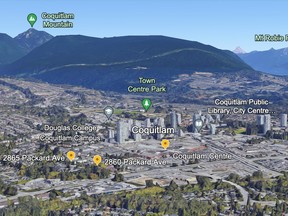Opinion: $71 million from the new Rental Protection Fund will purchase two housing co-operatives in Coquitlam City Centre — where city council had already taken action to protect them

Article content
How are we to understand the actions of a provincial government that passes legislation to impose minimum densities in 104 transit-oriented development areas across B.C., and then uses the first large payment from its own Rental Protection Fund not to increase the housing supply, but to freeze a low-density neighbourhood in one of the fastest growing of those transit-adjacent areas?
Advertisement 2
Article content
Premier David Eby’s NDP administration has pronounced two laudable goals. First, with Bill 47, the province set minimum densities and heights around important transit nodes, saying in effect that B.C.’s need for housing — and to support expensive transit investments — trumps the desire to protect traditionally low-density neighbourhoods.
Article content
Second, in 2023, the government created a $500-million taxpayer-financed Rental Protection Fund, and we at Goodman Commercial welcomed the idea of helping non-profit players take a bigger role in supporting vulnerable community members. Having worked with many non-profits over the years, we’ve seen and admired the positive impact non-profits can have helping to address the housing affordability crisis.
But it was an unwelcome surprise when the government announced in early February that the first large expenditure from its new rental fund — $71 million — would go toward purchasing a pair of housing co-operatives comprising 290 suites in Coquitlam’s City Centre neighbourhood.
Those two properties, at 2860 and 2865 Packard Avenue, sit on a low-rise, low-density 6.5-acre site in the heart of a designated high-density, transit-oriented community. They are directly across from Coquitlam Centre mall, one of the largest shopping centres in the region, and roughly 500 metres from Coquitlam Central SkyTrain and West Coast Express stations. This is exactly the kind of property the province targeted in Bill 47 — one that is ripe with potential and wasteful to overlook.
Article content
Advertisement 3
Article content
Coquitlam council had already recognized the area’s potential. It had even taken action to protect the more affordable rental accommodations within the two co-ops.
The 2020 Coquitlam City Centre Area Plan identified this property as a “Special Policy Area,” and granted additional height and density to ensure these 290 non-market units could be replaced within any new development.
That was appropriate.
This is a high-demand neighbourhood, already attracting proposals for up to 60-storey towers. The Coquitlam Centre mall is up for redevelopment and TransLink is exploring development options for a nine-acre parking lot that it owns one block south of the Packard Avenue co-ops. The potential here is huge.
Yet, by our math, the Packard Avenue co-ops are built out to a density of barely more than a single-family suburb. This leaves approximately 680,000 square feet that could be added in new development consistent with the province’s own density legislation. Assuming an average unit size of 750 square feet, a developer could replace the existing 290 suites with the same unit mix and floor area, and then add roughly 770 new homes on this transit-oriented site.
Advertisement 4
Article content
With 6.5 acres of land, and a nine-acre, publicly owned parking lot nearby, some creative thinkers could surely devise a plan to redevelop the property in phases, ensuring minimal disruption for current tenants.
Rather than “saving” 290 aging units, we could be delivering 1,060 new homes with modern amenities built to current environmental and building code standards. Instead, at a time when the NDP is tripping over itself to find ways to increase housing supply, it has used a large amount of taxpayer money to block redevelopment, while again repeating a tiresome and needlessly divisive attack on “profit-seeking speculators.”
It will be interesting, now that the property is under non-profit ownership, to see if the province and federal government are committed to the goal of housing a rapidly expanding population or will this be another lost opportunity to do some real good for the community.
Mark Goodman and Ian Brackett are brokers at Goodman Commercial, which specializes in the sale of rental apartment buildings and development sites in Metro Vancouver. They also publish The Goodman Report.
Bookmark our website and support our journalism: Don’t miss the news you need to know — add VancouverSun.com and TheProvince.com to your bookmarks and sign up for our newsletters here.
You can also support our journalism by becoming a digital subscriber: For just $14 a month, you can get unlimited access to The Vancouver Sun, The Province, National Post and 13 other Canadian news sites. Support us by subscribing today: The Vancouver Sun | The Province.
Article content















.jpg?itok=F2C4uk0x)




Discussion about this post